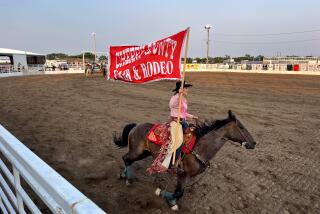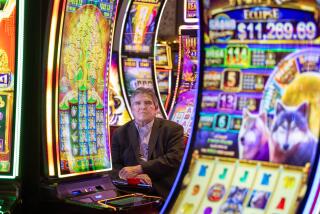The Ins, Outs and Odds of Becoming a Casino Town
While nosing around the College World Series in Omaha last month, I came upon a man and woman in a far corner of the stadium grounds. They were asking people to sign petitions to allow casino gambling in Nebraska.
One of the signature collectors, John Averyes from Sacramento, said he was getting mixed results from the good Nebraska folks. Some liked the idea; others said it would destroy their home values and lead to crime.
“As if you can’t find crime five minutes from here right now,” he said.
The pro and con reminded me of the spasmodic debate in Garden Grove, where anti-gambling forces say, “No way, no how,” and casino supporters say, “Shuffle up and deal.” At a council meeting last September, a 3-2 majority permitted the city to talk to potential gambling interests, but we reported last week that the prospects for a hotel-casino near Disneyland on Harbor Boulevard appear all but dead.
That prompted me to call Bob Mundt, the president of the Council Bluffs (Iowa) Chamber of Commerce. Council Bluffs is a town of 60,000 across the Missouri River from Omaha and, since 1995, has opened three gambling houses -- two on riverboats and a third adjacent to a dog track. They came after the Legislature in 1994 relaxed sanctions against gambling.
Knowing the Bluffs to be teeming with God-fearing people (like Garden Grove) and knowing that lots of like-minded Omahans patronize the Iowa casinos, I ask Mundt how the decade of gambling has gone.
Advisory to casino opponents: Don’t read any further.
“It’s been very positive for us,” he says, “largely because we set it up correctly.”
By that, he means the city struck deals with the casinos that have paid off like loose slots. “It has stimulated our tourism tremendously,” Mundt says. “Before, it was very limited.”
All because of casinos?
“Gaming really was the catalyst,” Mundt says. “Since then, we’ve developed a lot of other attractions that added to that mix. It has added tremendously to our hotels and restaurants and stimulated our retail economy. It’s done a lot of good things from that perspective, but it’s also generated tax revenue for the city, county and state. And it generated, I guess, a mentality that we can grow and expand. It really triggered a lot of other growth in our community.”
I’ve written before that I’m not lobbying for a casino in Garden Grove. I am a neutral observer. Nor am I saying that Council Bluffs is Garden Grove, except that both have grappled with finding ways to avoid economic downturns. And that both towns, from my experience, are made up of pretty regular folks.
Nor did I have any idea whether Mundt, as an emblem of the Bluffs’ business community, would be a casino fan or not. He says, “I choose not to gamble,” preferring to spend his money on his family, but he is an unabashed supporter of what the casinos have done for his town.
Mundt says the casinos competed strongly to get their feet in the door. The Bluffs, he says, bargained from strength but notes that other communities were not so savvy. The net result, he says, is that some casino revenues go into a foundation that “has created a very large community endowment. Every year, they grant literally millions of dollars to projects in Council Bluffs and the surrounding area.”
Gamblers’ dollars, he says, have helped build a new library, a performing arts center, a recreation complex and provided “seed money for a ton of community projects.”
Yes, Mundt says, some people still oppose the casinos. Some object philosophically to gambling, while others lament the increased traffic and other stresses on the city’s infrastructure. People in Garden Grove have raised identical objections.
While not dismissing the concerns, Mundt says, “if someone needs a reason for something, they’ll use gaming because it’s a pretty good scapegoat for some things.”
To get casinos, Iowa residents in Pottawattamie County had to vote. Eighty percent of them said yes to casinos, Mundt says.
“Yeah, we’re conservative, but the people are realistic,” he says. “Someone was going to have gaming around us, so if someone was going to get it, we figured, ‘Why not get it here?’ ”
If Garden Grove nixes casino talk, so be it. No skin off my nose.
Garden Grove City Councilman Harry Krebs has been an outspoken casino supporter. I think I heard him gnashing his teeth Friday afternoon while listening to my recitation of Mundt’s observations.
Krebs refuses to call the hotel-casino project a dead duck in Garden Grove but concedes nothing looks promising at the moment. If the road ever gets smoothed over for a casino, Krebs says he’d want to put the question on a local ballot.
Mundt obviously doesn’t have a horse in the Orange County race. When I give him some of the Garden Grove particulars and mention, among other things, Disneyland’s opposition, he has a couple parting thoughts.
“It created momentum and a can-do mentality here,” he says of the mid-’90s casino binge. “It stimulated our retail market. That’s gone through the roof. It also stimulated housing starts.”
The Bluffs, of course, didn’t have Disneyland a few minutes away and saying no.
Of which Mundt says: “I’d see that as being a nice complement to Disneyland.”
Dana Parsons’ column appears Tuesdays, Thursdays and Saturdays. He can be reached at (714) 966-7821 or at dana.parsons@latimes.com. An archive of his recent columns is at www.latimes.com/parsons.
More to Read
Sign up for Essential California
The most important California stories and recommendations in your inbox every morning.
You may occasionally receive promotional content from the Los Angeles Times.










